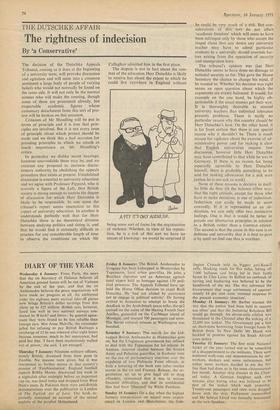THE DUTSCHKE AFFAIR
The rightness of indecision
By 'a Conservative'
The decision of the Dutschke Appeals Tribunal, coming as it does at the beginning of a university term, will provoke discussion and agitation and will unite into a common sentiment a large body of people of varying beliefs who would not normally be found on the same side. It will not only be the normal ninnies who will make the running, though some of these are prominent already, but respectable academic figures whose customary detachment from this sort of pro- test will be broken on this occasion.
Criticism of Mr Maudling will be put in terms of principle and it is true that prin- ciples are involved. But it is not every issue of principle about which protest should be made and we think this a bad occasion for parading principles to which we attach as much importance as Mr Maudling's critics.
In particular we dislike secret hearings, however unavoidable these may be, and we mistrust any proposal to increase discre- tionary authority by abolishing the appeals procedure that exists at present. Uninhibited discussion is essential to university education and we agree with Professor Pippard, who is scarcely a figure of the Left, that British society is strong enough to sustain the degree of discussion for which Herr Dutschke is likely to be responsible. In one sense the tribunal's report seems insensitive to this aspect of university education. In another it understands perfectly well that for Herr Dutschke there is no theoretical division between studying politics and doing it, and that he would find it extremely difficult in • practice for any considerable length of time to observe the conditions on which Mr
Callaghan admitted him in the first place.
The dispute is not in fact about the con- tent of the education Herr Dutschke is likely to receive but about the extent to which he could live anywhere in England without
A PITY IT'S ONLY ALIEW5,S1R.
being some sort of focus for the organisation of violence. Whether, in view of his reputa- tion, he is a risk of this- sort we have no means of knowing: we would be surprised if
he could be very much of a- risk. But con- siderations of this sort do not affect `academic freedom' which will seem to have been infringed only by those who accept the stupid claim that any desire any university teacher may have to admit particular students to a university should override fac- tors arising from the operation of security and immigration laws.
The tribunal's opinion was that Herr Dutschke seems to have done no damage to national security so far. This gave the Home Secretary the chance to change his mind, if he wanted to. Whether his decision was right seems an open question about which the arguments are evenly balanced. It would, for example on the one hand, be highly ob- jectionable if the usual ninnies got their way. It is thoroughly desirable to remind university teachers that unlimited tolerance presents problems. There is really no particular reason why this country should be Herr Dutschke's host. On the other hand, it is far from certain that there is any special reason why it shouldn't be. There is much reason for vigilance about the exercise of ad- ministrative power and for making it clear that English universities require free discussion', however little Herr Dutschke may have contributed to that while he was in Germany. If there is no reason for being especially agreeable to Herr Dutschke himself, there is probably something to be said for making allowances for a sick man (unless he is too sick to work).
None of these reasons is decisive in itself. So little do they tilt the balance either way, that the right attitude, except for those who have to make decisions, is one of indecision. Indecision can easily be made to seem cowardly. If it is represented as an ab- dication, we can only offer two instinctive feelings. One is that it would be better to parade our libertarian principles in relation to a British rather than a German citizen. The second is that the cause in this case is so dubious and unworthy that it is best to pass it by until we find one that is worthier.










































 Previous page
Previous page